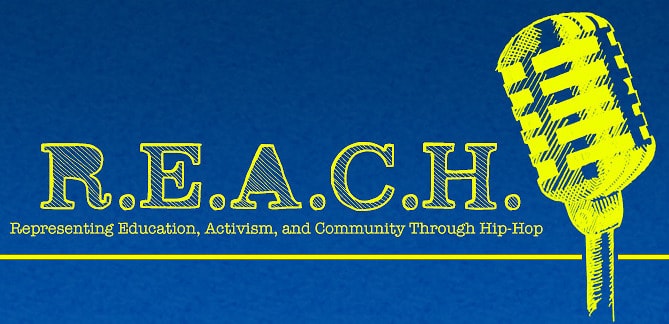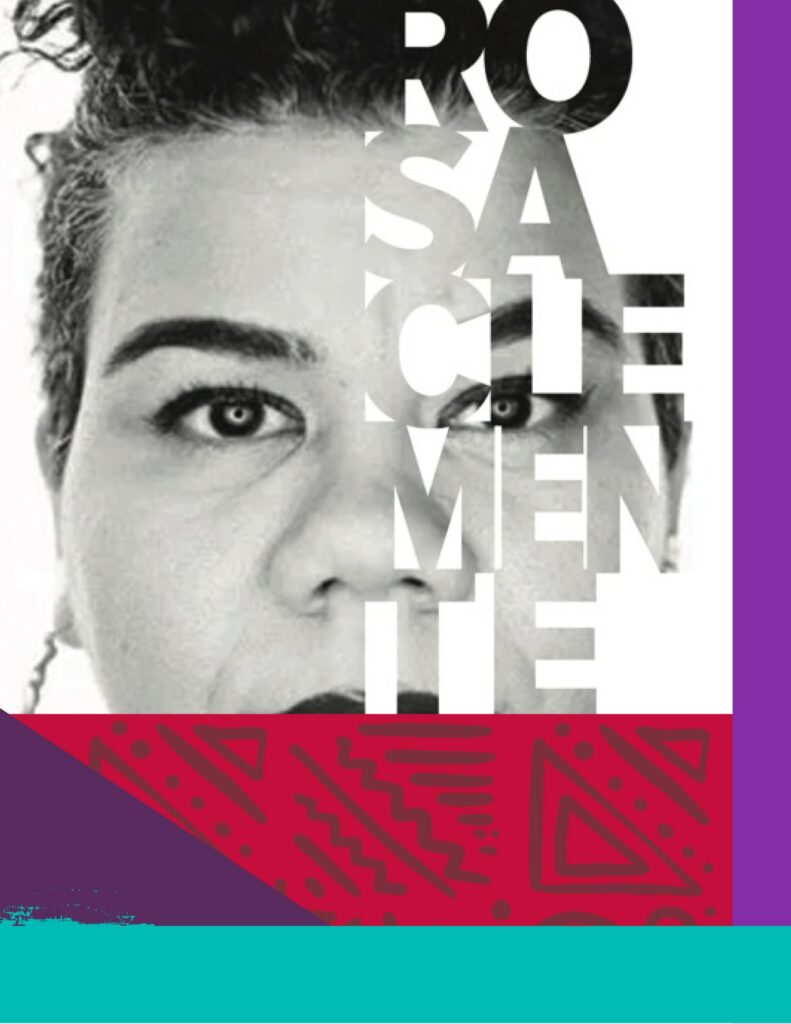[PDF]
April 18th, 2016
Contacts: Rosa Clemente, DJ Kuttin Kandi, Julie-C at reachiphop@gmail.com
Hip Hop culture, founded in the Bronx in the early 70’s by Black and Brown working class youth, has always existed to facilitate a reclamation of space for the silenced majority and marginalized communities in the face of social, political, and economic oppression. Hip Hop has always embodied the core values of peace, love, knowledge, and unity. Pioneers of Hip Hop, such as Afrika Bambaataa, promoted these values and saved countless lives by not only providing a platform for connection and expression, but also in their work mediating disagreements between street organizations and artists. This inclusive, culture-centered approach to empowerment, self-expression, and conflict resolution decreased violence and proved to be healing and transformative for communities, influencing millions across the globe and creating an echo-chamber for the unheard.
It is with this legacy in heart and mind that we, practitioners, artists, activists/organizers, and scholars of Hip Hop are asking our communities to join us in acknowledging all the victims that have stepped forward to tell their truth. We thank pioneer Paradise Grey for inspiring this challenging conversation. We recognize Ronald Savage and Hassan Campbell for their brave decision to come forward publicly; when we know even in 2016 America, victims are often the ones blamed, shunned, and bullied. We also acknowledge the other men who have come forward in the last days. As those that love Hip Hop, many of us unabashedly know that the culture of Hip Hop saved our lives, and we must work together to evolve in this difficult time. It is first and foremost our moral and spiritual imperative, but also an extension of upholding the values that Afrika Bambaataa himself has inspired in many of us.
The co-authors and signers of this statement believe that up to this point, the statements offered by Bam and his attorney and the statements issued unilaterally by individuals on behalf of Universal Zulu Nation have not reflected these values. Instead, by falsely claiming to represent the perspectives of thousands of Zulu members, affiliates, and identifiers with Hip Hop culture globally, those statements are effectively silencing the Hip Hop community. We also reject the deflection narrative that this is a COINTELPRO-like conspiracy, as it is an injustice to those who have and are experiencing true state oppression. So in the interests of healing and truth, we as members of the Hip Hop community, many of whom are survivors of abuse, are calling for an end to the silence. We offer the following guiding points as we work together to build a Hip Hop intersectional framework:
Build Movements Not Structures
Hip Hop as we came to know it by our pioneers is a movement and a culture, not a structure. This alone is revolutionary. While a part of preserving Hip Hop culture is to honor one another, especially those who have had a hand in founding Hip Hop, if structures of hierarchy and power within Hip Hop culture are reinforcing secrecy and idolatry, they must be dismantled. Secrecy and lack of transparency maintain gatekeepers and keep people in positions of power. Idolatry romanticizes those positions of power and the people that hold them, elevating them above critical accountability. While one such as Afrika Bambaataa has done many good deeds and organizing work in our communities; it doesn’t mean he’s sacrosanct. No one should be above accountability. Hence, we must push to eradicate hierarchal structures that stem from white supremacist, patriarchal, capitalist, and colonizer/settler mentalities and begin to work from a decentralized movement space.
Dismantle Rape Culture
How we respond to sexual abuse victims/survivors coming forward is an integral part of either dismantling or perpetuating rape culture. While many in the community are in shock of the accusations against Afrika Bambaataa and are still processing; it has been an awakening on how rape culture creates an atmosphere of “flight” and “freeze” due to the denial, acceptance, and normalization of sexual violence.
End the Cycle of Abuse
A few of the victims/survivors that have come forward were children at the time of abuse. Child abuse happens because of abuses of power. Sexual violence is a form of control and domination that is rooted in white supremacy patriarchy. Many people have been responding to one of the allegations made by stating that one of the victims/survivors was at an age of consent. While it is necessary to address the abuse of power over children, it is also important to acknowledge that control and domination can be exploited over the age of consent. It is entirely conceivable that Afrika Bambaataa used his power and influence as a prominent hero-like figure in the Hip Hop community to maintain authority, dominate, and abuse people who looked up to him as a mentor and as the “Godfather of Hip Hop”.
What is also being unraveled amidst the allegations is the emasculation of the victimized male which then causes the perception that the survivor “must be gay.” This fallacy is rooted in homophobia and oppression of LGBTQ and gender nonconforming identities and minimizes the truth of sexual assault against men.
It is necessary that our community focuses our work in preventing sexual violence. We must challenge sexual violence in our communities and make changes in our values and norms in order to prevent sexual violence by cultivating accountability and restoration, promoting bystander intervention, and creating supportive safe healing spaces for survivors and implement a restorative justice framework into the work we do, only then can we begin to heal.
Journey Into The Hip Hop Millennial Rebirth
Hip Hop is a vehicle for social justice and a form of healing and transformation for many of us. Thus it makes sense that we, as a Hip Hop community, embrace self-determination in moving forward with transformational organizing work. We understand the social, political, and institutional conditions which contribute to our internalized oppression and complicity in cycles of oppression. Hurt people hurt people. By requiring accountability for oppression and harm, centering those most affected by the oppression, being transparent and inclusive, and providing opportunities for mediation rather than punishment, we create space for transformative healing without relying on institutional systems to find resolution. This is an opportunity for a rebirth of Hip Hop in the millennial age, one that creates foundational changes in individuals, interpersonal relationships, communities, and organizations while invoking our founding principles of peace, love, and unity. We owe it to ourselves to preserve the legacy of Hip Hop culture by remembering that this is bigger than Hip Hop.
What Next?
❏ Sign and share the “Hip Hop Speaks Out” Petition to support Paradise Grey and the Hip Hop World Council
http://petitions.moveon.org/sign/hip-hop-speaks-out-on
❏ On Wednesday, April 27, 2016 at 5:00 pst/8pm est we will be convening a virtual town hall on Google Hang Out called “Microphone Check: Hip Hop Responds to Sexual Violence.” Join us.
❏ Go to our Tumblr page @ reachiphop to share this statement and/or sign onto it. You can also reach us at reachiphop@gmail.com
❏ Use the hashtags: #hiphopbreaksthesilence #movementsnotidols on Twitter to share your thoughts, experiences, and resources and tag our Tumblr page: reachiphop.
In love, peace and unity,
DJ Kuttin Kandi, A People’s Hip Hop DJ Scholar
Julie-C, emcee, Hip Hop organizer, educator, @juliechang206
Rosa Clemente, Hip Hop organizer, 2008 Vice-Presidential candidate (GP-Green Party)
———————————
SIGNERS:
Paradise Gray, Hip Hop pioneer of X-Clan & 1Hood
Terrance Dean – Ph.D. student, Religion, Vanderbilt University; Author, “Hiding In Hip Hop”
M.C. K~Swift, New Rap Order
Shades of Silence, artist collective
Terry Lewis aka Kid Lucky
Larry Mizell Jr., Writer/DJ/Artist
Logic Amen, Writer, performing artist, educator
Ebony “Sima Lee” Outlaw- Emcee, Community Organizer, child abuse survivor, former member of the UZN
Claudia Calleros DJ SOYO, broken hearted Hiphoppa
JLove Calderon, Hip-Hop educator, activist & producer
Martha Diaz, Hip-Hop Organizer, Hip-Hop Education Center
Mutulu Olugbala (M1), Activist and Artist
Marc Lamont Hill, Distinguished Professor Africana Studies, Morehouse College
Kristine Wright, Ph.D. Educator/Sociologist
Gabriel Teodros, Writer and MC.
Mark Anthony Neal, Professor + Writer
Byron Hurt, filmmaker/anti-sexist activist, director of Hip-Hop: Beyond Beats and Rhymes
Sis. Asantewaa Nkrumah-Ture, Domestic Violence Advocate, Revolutionary Pan-Africanist,
Jared Ball, Father, Husband, Teacher, @imixwhatilike
Jasiri X, Hip Hop artist, 1 Hood
Kali Akuno, Cooperation Jackson,
Heather Sanchez “Sol”, Hip Hop Organizer and Activist
Dhruv Shah, Filmmaker
Maria Rodriguez- Morales Poet, Writer, Educator
Rosa Javier Broadnax, Roza Salbahe 206 Zulu.
Dawn Fischer, Professor
Leroy F Moore Jr, Founder of Krip-Hop Nation, Activist, Author & Journalist.
Rebecca McDonald, Director/Producer
Mark Villegas, co-editor, Empire of Funk: Hip Hop and Representation in Filipina/o America
Hank Williams Lehman College, CUNY
Vicente Alba-Panama, organizer, Young Lord
Gwendolyn Pough, Women’s and Gender Studies, Syracuse University
Black Lives Matter-Upstate, NY chapter
April R. Silver, AKILA WORKSONGS, Social Entrepreneur, Activist, Writer/Editor
Asia Yu, No Easy Props
Michael Phillips aka Page One (206 Zulu)
Masai, emcee/youth mentor
JD Flow, LHU, FFU
Monica Cheri, Activist
AF3IRM, Anti-imperialist, transnational feminist women’s organization
Poesia Mariarte, Visual Thinker
Alan Ket, Artist
Imani Perry, Professor, writer
Dorian Clark, Organizer, directed, The Sea Level TV
Joshua “Coda” Rowlett, Community Activist/Organizer/Bboy
Invincible/ill Weaver, Detroit (Anomolies, Complex Movements, Emergence Media)
Big Tara, BGirl for the Upliftment of People
Sofia Quintero, Writer, producer
Victorio Reyes, Poet
Mystic, MC, artist, organizer

